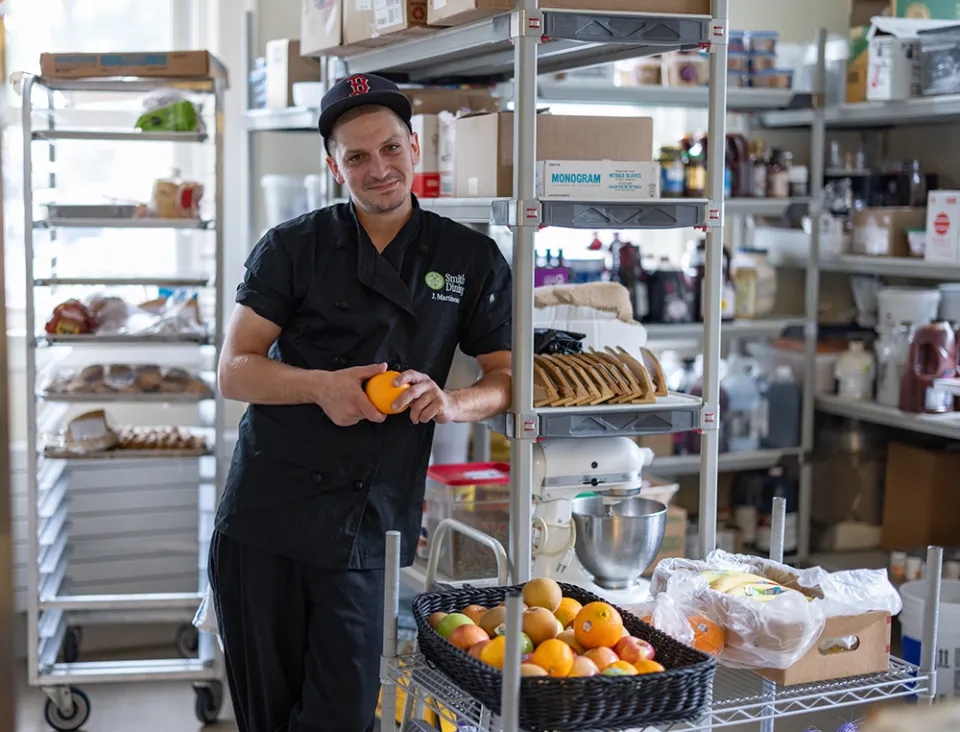He Keeps Food-Sensitive Smithies Safely Fed
Smith Quarterly
Students honor Julian Martineau with a Gavel Award
Julian Martineau came to Smith after a decade in restaurant kitchens.
Photographs by Jessica Scranton
Published October 11, 2024
As a teenager growing up in Northampton, Julian Martineau remembers getting booted off the Smith campus for skateboarding there with friends. Now, at 30, Martineau has come full circle. He recently began his fourth year as a cook’s assistant at the college, where he’s so beloved by the community that he received last year’s Elizabeth B. Wyandt Gavel Award. The award, whose recipients are nominated by students, recognizes Smith staff members who provide outstanding service.
Martineau was honored for “his extraordinary commitment to making food safe, equitable, and, above all else, absolutely delicious,” then–Student Government Association vice president Alex Francesconi ’24 said.
Martineau’s role at Dawes House, where Smith’s gluten-free dining hall is located, goes far beyond standard kitchen duties. Opened in 2015 after advocacy by a student group called Celiacs of Smith College, Dawes serves as a safe zone for students with a variety of health-related dietary restrictions. It’s a crucial resource for those who can’t safely eat at other dining halls on campus. Martineau coincidentally began working there just as Anne Stolarik, his aunt, retired from Dawes after her own kitchen career at Smith.
“It can be a scary house to work in because of the allergies and having to label everything and the potential of getting somebody sick,” says Martineau, who came to Smith after a decade in restaurant kitchens. But he has embraced the challenge. “I love it, and I love my girls. They’re the most sincere. They’ll tell you exactly what they need and why they need it, and I love taking care of them.”
This deep bond with students is something Martineau cherishes. Beyond ensuring meals are safe, he comforts students on tough days and pretends not to hear the juicy gossip that finds its way to his ears as he works.
One student who appreciates Martineau’s care is Gavel Award nominator Tallulah Costa ’25. Toward the end of her first year at Smith, Costa was struggling with a spate of medical issues that made it difficult to eat safely at other campus dining facilities. She was eventually diagnosed with small intestinal bacterial overgrowth, a condition that required a restrictive diet and careful management as she reintroduced foods into her meals.
No yeast, no legumes of any kind, no raw fruit, no raw vegetables, no garlic, no onion—the list goes on,” Costa recalls. “My meal every day would be rice and a cooked meat, and then I had to steam my vegetables for a certain amount of time so they were cooked enough so my body could digest them. That was rough, and I was really concerned about going back to school.”
That’s when Costa met Martineau. “I had to say, ‘Hi, I’m Tallulah. I have this chronic illness that’s causing me to have this horrible diet. Is there any way you can make me something separate off the line?’” she says. “I was only met with kindness.”
Martineau and the other Dawes cooks prepare a main hot buffet of food for every lunch and dinner service, labeling ingredients that students with allergies or dietary restrictions need to avoid. Students like Costa speak directly with the kitchen staff when they arrive, ensuring they receive a meal they can eat safely.
“What ensued was a beautiful friendship between myself and my chefs,” Costa says. “Whenever I’d go into Dawes, I’d always stick my head into the kitchen.” This simple act of checking in turned into a ritual, with Costa bringing friends to meet the kitchen staff and even introducing her parents to Martineau during a campus visit. They were happy to meet one of the people keeping their daughter safe as she attends school far from her Virginia hometown. “He’s like an uncle to me at this point,” Costa says. “Julian did so much for me, and I am so grateful for him.”
The feeling is mutual, Martineau says. He describes the bittersweet annual tradition of streaming the Commencement ceremony in the Dawes kitchen while the staff prepares the school year’s final meal, cheering when “their” graduates’ names are announced. “It’s really sad every year, and this year will probably be the toughest,” he says. “I was literally there when they started college.”

